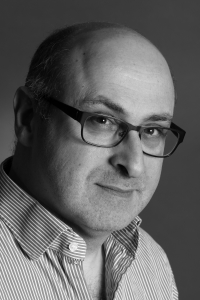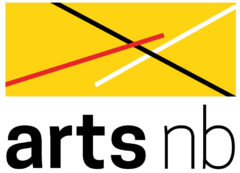Home » News » Blog » LGA 2017 – Stephen Tobias
LGA 2017 – Stephen Tobias

The Lieutenant-Governor’s Awards for High Achievement in the Arts recognize and celebrate outstanding New Brunswick artists and writers who have distinguished themselves by the excellence of their achievements and their contribution to the arts in the province.
Stephen Tobias, laureate of the 2017 Lieutenant-Governor’s Award for High Achievement in Performing Arts, answers a few questions about his life and art practice.
- Tell us about your upbringing, where you grew up, etc.
I grew up in East Saint John in a family of entrepreneurs and small-business owners. In my teen years, my family moved to the Rothesay area and I was fortunate enough to attend Rothesay Collegiate School which was essentially a military academy at that time. That led to several years of military training and summers spent on bases across the country. There was a time when I felt that Royal Military College would be in my future. Things change.
Growing up I spent a lot of time working in businesses owned by my parents or older brother. There is a very different work ethic that comes from growing up in a world that is not 9 – 5… an environment where success is directly related to effort and output. My family didn’t just teach me to work hard, they taught me to work smart. To this day, there is an aspect of my life where my work is with me 24-7 and the search for new opportunities is all-consuming.
One principle which was never explicitly spoken, but has always stayed with me, is the idea that we have a responsibility to leave things better than we find them. If you own a property; improve it. If you own a business; build it. If you see a vacuum; fill it. Don’t complain about what isn’t there; create it.
- Was there an inspiring moment in your youth that influenced your choice of career?
I’m not sure if there was any one moment. As a young man, I enjoyed attending theatre but actually was never a ‘theatre kid’. I had no interest in performing or participating in any way until high-school. I recall my parents taking me to movies and having an early love of cinema. Visits to the NB Museum and the Beaverbrook Gallery: yes. But participating in the arts in any way… performing… it never occurred to me.
Theatre snuck up on me. What started as a friendly rivalry with a best friend, auditioning for a play to impress a girl – ended up creating a life-long love of theatre. I only performed in 2 plays in high-school but I knew that I wanted to study and learn more. It very quickly became the one place where I actually felt like I had something to offer.
In my training years, I was always lucky in that I had many mentors who took a lot of time with me. Rob Hook, Robert Merritt, David Overton, Dorothy Ward, Tom Kerr, Walter Borden and many others took time to share stories and lessons about the craft of theatre and the discipline required to do well.
- When did you start your practice? Were there particular challenges that you faced? What important lessons have you learned?
My practice began immediately upon graduating from the conservatory theatre program at Dalhousie University. I was fortunate enough to have been noticed by Edmund Mclean, a director from Cornerbrook Newfoundland who flew me in to perform in Streetcar Named Desire. From there, I worked fairly steadily in Newfoundland and Nova Scotia for the next two years. At that time, as I got to know more mid and late career theatre artists, I started to question my career path. I realized that the instability and lack of career control were not for me. I could never get comfortable with the idea of living out of a suitcase, practicing a craft that required my constantly obtaining permission from directors, agents, or producers just to do the thing I enjoyed.
Ultimately, I left the industry and decided eventually to work on building something here in New Brunswick.
- What is your art practice about? Tell us more about your creative process.
The core of my practice is about collaboration and connecting people.
- How important is public engagement for you and your work?
Art is public engagement. Theatre is pubic engagement. I believe that. For me, all art involves a dialogue with an audience. In the world of arts organizations, the need to create impact is even more profound. By their very nature, all arts organizations exist to serve the communities in which they reside. Success must be measured in terms of overall community impact. Without an audience it’s all just rehearsal.
- What would you tell today’s emerging artists?
Two things:
One – find your own way. There is an implied orthodoxy in the art world that can limit creativity. There will be occasions where teachers or colleagues will imply that your art may not be as important if you don’t live in the right place, or work with the right company, or join the right group. The fact is, there is no single ‘right’ way. The ‘right’ way will vary from community to community, region to region, artist to artist. Find what works for you.
Two – Collaborate with everyone you can, but also make sure that you have a life outside of your art. Balance is important. Finding distance from your work will give you new perspectives. Good art will always comment on the world around us. It’s good for artists to ensure they experience the broader world beyond their artistic practice.
 Stephen Tobias is a theatre artist, cultural promoter and arts policy advisor who has spent the bulk of his career in Saint John. A graduate of the Conservatory Acting Program at Dalhousie University, Stephen co-founded the Saint John Theatre Company in 1990 in order to provide opportunities for local theatre practitioners.
Stephen Tobias is a theatre artist, cultural promoter and arts policy advisor who has spent the bulk of his career in Saint John. A graduate of the Conservatory Acting Program at Dalhousie University, Stephen co-founded the Saint John Theatre Company in 1990 in order to provide opportunities for local theatre practitioners.
Since then, Stephen has led the company as a board member, director, actor and fund-raiser in order to grow the company into a major force in provincial theatre production. Recent accomplishments include a $1.8 million capital campaign, the establishment of New Brunswick’s first Fringe Festival, creative collaborations of new works of the theatre, and an international tour of a Saint John Theatre Company production to Konstanz, Germany.


 Stephen Tobias is a theatre artist, cultural promoter and arts policy advisor who has spent the bulk of his career in Saint John. A graduate of the Conservatory Acting Program at Dalhousie University, Stephen co-founded the Saint John Theatre Company in 1990 in order to provide opportunities for local theatre practitioners.
Stephen Tobias is a theatre artist, cultural promoter and arts policy advisor who has spent the bulk of his career in Saint John. A graduate of the Conservatory Acting Program at Dalhousie University, Stephen co-founded the Saint John Theatre Company in 1990 in order to provide opportunities for local theatre practitioners.